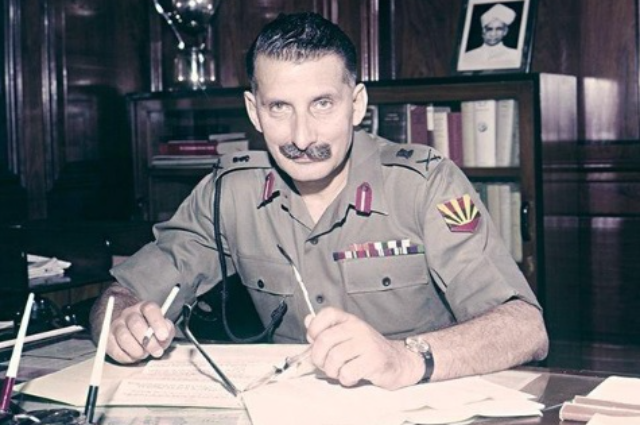Sam Manekshaw, fondly known as Sam Bahadur, was not just a man; he was a legend etched in the annals of India's military history. His life, marked by courage, leadership, and unwavering dedication, continues to inspire generations.
Born on April 3, 1914, in Amritsar, Sam Manekshaw was destined for greatness. His journey to becoming one of India's most revered army officers was characterized by determination and resilience. Commissioned into the British Indian Army during the tumultuous times of World War II, Manekshaw quickly rose through the ranks due to his exceptional leadership qualities and tactical brilliance.
One of the defining moments of Manekshaw's career came during the 1971 Indo-Pak war. As the Chief of the Army Staff, his strategic acumen and remarkable leadership were instrumental in India's resounding victory, leading to the creation of Bangladesh. His foresight, meticulous planning, and the ability to inspire his troops turned the tide of the war decisively in India's favor.
Sam Manekshaw was not merely a strategist; he was a leader who deeply cared for his soldiers. His famous statement, "There will be no withdrawal without written orders, and these orders shall never be issued," embodies his unwavering commitment to his troops. He valued their lives and well-being above all else, earning him immense respect and adulation from his fellow soldiers.
Beyond his military prowess, Manekshaw's charismatic personality, wit, and sense of humor endeared him to all who crossed paths with him. His anecdotes and speeches were laced with wisdom and a touch of humor, making him not just a military leader but a revered figure in popular culture.
Sam Manekshaw, a titan in India's military history, embodied the pinnacle of leadership and valor. His distinguished career, spanning decades, showcased not only strategic brilliance but an unwavering commitment to his soldiers. As Chief of the Army Staff, his leadership during the 1971 war was instrumental in India's victory, earning him the moniker "Sam Bahadur." Beyond his military genius, Manekshaw's charismatic persona, wit, and multilingual skills endeared him to all. His compassionate nature and unyielding principles set him apart, emphasizing his deep concern for his troops' welfare. Manekshaw's legacy reverberates through the corridors of Indian military institutions, a testament to his enduring impact as a leader, an icon of courage, and a paragon of integrity.
His legacy extends far beyond the battlefield. His leadership, integrity, and commitment to duty serve as a guiding light for the youth of India, inspiring them to embody the values of courage, resilience, and selflessness. His remarkable journey from a young boy in Amritsar to the highest echelons of the Indian Army stands as a testament to the power of dedication and determination.
Indo-Pak War of 1971
Sam Manekshaw played a pivotal role in the Indo-Pak War of 1971, a conflict that led to the creation of Bangladesh. As the Chief of the Army Staff, his strategic brilliance, leadership, and meticulous planning were instrumental in India's resounding victory.
Manekshaw's approach to war was marked by a blend of meticulous planning and an understanding of ground realities. He advocated for a cautious yet comprehensive strategy, urging the government to allow the military the time needed to prepare adequately before engaging in full-scale conflict. His insistence on waiting for favorable conditions before launching the war showcased his prudence and foresight.
When the war eventually began, Manekshaw's planning and execution were impeccable. He orchestrated a multi-pronged military offensive that outmaneuvered and overwhelmed the Pakistani forces. The Indian military, under his guidance, executed operations in various sectors, including the western and eastern fronts, which ultimately led to the decisive victory and the eventual surrender of Pakistani forces.
His leadership during the war was marked by a deep concern for the welfare of his troops and a meticulous eye for strategic advantage. His ability to inspire and motivate the soldiers under his command was unparalleled, instilling a sense of confidence and determination that was crucial in achieving success on the battlefield.
Manekshaw's strategic genius, coupled with his unwavering commitment to the welfare of his soldiers, was the cornerstone of India's victory in the 1971 war, solidifying his legacy as one of India's greatest military leaders.
Promoted to the Rank of Field Marshal
Sam Manekshaw's rise through the ranks in the Indian Army was a testament to his exceptional skills, leadership, and dedication to duty. He joined the Indian Military Academy in 1932 and steadily ascended the ranks, showcasing remarkable abilities and earning accolades along the way.
Manekshaw's promotions were based on his outstanding performance, leadership qualities, and his contributions to the military. Notably, his tenure as the Chief of the Army Staff from 1969 to 1973 was a pinnacle in his career.
His promotions followed a conventional trajectory within the army, from being commissioned as a Second Lieutenant to rising through various ranks, owing to his exemplary service and demonstrated capabilities. His leadership roles in different capacities and his successful execution of military operations during conflicts like the Indo-Pak wars were instrumental in his promotions.
Manekshaw's final promotion to the highest rank, Field Marshal, came in 1973, making him the first Indian Army officer to achieve this prestigious position. This recognition was a testament to his unparalleled leadership, strategic prowess, and immense contributions to the Indian Armed Forces. His promotion to Field Marshal marked a historical moment and solidified his status as an iconic figure in India's military history.

